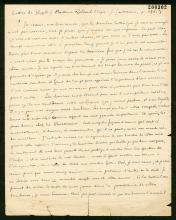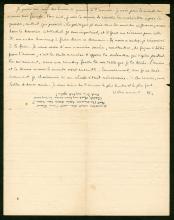BRACERS Record Detail for 19309
To access the original letter, email the Russell Archives.
"Lettre de Buzot a Madame Roland (copie: J. Guillaume, p. 395) je crains, ma bien-aimée, que la derniere lettre que je vous ai envoyée n'est pas arrivée, car je pense que j'aurais eu une reponse."
This is a letter from Russell to Colette, disguised as being copied from a book. A typed copy was made for a literary collection of their letters as no. 39 (.052386, pp. 54–5, record 99849). Seven words were inked out of the copy.
The date has been assigned based on document 200304, record 19310, in which BR writes that he has seen her message in The Times of 27 May. The false page number in this communication is earlier than the one in document 200304, plus in this letter he says he has not yet heard from her.
Letter 8
BR TO CONSTANCE MALLESON, [c.26 MAY 1918]
BRACERS 19309. ALS. McMaster
Previous Brixton letter, BRACERS 19307; next letter, BRACERS 46915
Edited by K. Blackwell, A. Bone, N. Griffin and S. Turcon
<Brixton Prison>1
<c.26 May 1918>2
Lettre de Buzot à Madame Roland3 (Copie:4 J. Guillaume,5 p. 395.)
Je crains, ma bien-aimée, que la dernière lettre que je vous ai envoyée6 n’est pas arrivée, car je pense que j’aurais eu une réponse. Ou peut-être qu’elle est arrivée avec d’autres choses, et que vous ne l’avez pas vue. Le temps commence vite à paraître long quand je n’ai pas de vos nouvelles. Voici plus d’une semaine7 depuis la dernière fois que j’ai eu de vos nouvelles: c’était alors par le moyen des journaux. — Je pense sans cesse à vous ma chère amie. Je me rapellea continuellement les temps heureux du passé, et je me permets d’espérer qu’il y aura des temps non moins heureux dans l’avenir. C’est curieux combien il faut de tempsb pour apprécier l’importance d’une occasion. C’est curieux aussi qu’une occasion peut être importante pour l’un sans l’être pour l’autre. — Les derniers mois étaient pour moi d’une importance extrême, parce qu’ils me rendirent cette confiance que j’avais perdue, et sans laquelle il n’y a pour moi aucun vrai bonheur. Les temps pendant votre rougeole8 restent dans ma mémoire comme ayant eu une grande importance. Et après, les jours divins chez la Boismaison. Vous avez des façons d’aimer qui sont si merveilleuses, si douces, si caressantes, qu’il ne peut y avoir au monde rien de meilleur. J’entends encore en imagination le son tendre de votre voix quand elle exprime l’amour, la lumière divine qui brille parfois dans vos yeux, le sentiment de vos bras quand ils me protègent contre tous les spectres de l’enfer — et le contactec de vos lèvres — mais il faut mettre un terme à l’imagination, sans cela le désir me rendra fou. Oui, je vous aime; et je vous aime parce que vous savez aimer comme personne d’autre ne le sait. Je ne désire rien dans ce monde excepté vous et votre amour. Si la destinéd me permet de vivre le reste de mes jours dans la jouissance de votre tendresse, je serai heureux. Mais qui peut savoir ce que va donner l’avenir?
Je passe ici bien des heures à penser à l’avenir. Je vois pour le monde un avenir très funeste. Pour moi, je vois le devoir de rétablir la civilisation après la guerre, autant que possible. En politique je suis sans la moindre influence; mais dans le domaine intellectuel je suis important, et il faut me réserver pour cela. Il me reste beaucoup à faire dans ce domaine. Si vous m’aidez, je réussirai à le faire. Je veux vivre d’une manière saine, constructive, de façon à bâtir pour l’avenir; c’est la seule manière d’opposer la destruction qui s’opère partout. En m’aimant, vous me rendez facile la vie telle que je la désire. L’amour et le devoir envers le monde vont ensemble — heureusement, car je ne sais comment je choisirais si un choix était nécessaire. — Au revoir, ma belle et douce amie. Je vous aime de l’amour le plus tendre et le plus fort.
Votre amant
B.
<Translation:>
Letter from Buzot to Madame Roland (copy: J. Guillaume, p. 395.)
I’m afraid, my beloved, that my last letter that I sent you didn’t arrive, because I think I should have had an answer. Maybe it arrived mixed in with other things, and you didn’t see it. Time seems to pass slowly when I haven’t had your news. It’s been more than a week since I last had your news: it was then through the newspapers. — I think constantly about you my darling friend. I continually remember the happy times of the past, and I allow myself to hope there will be no less happy times in the future. It’s curious how much time it takes to appreciate the importance of an occasion. It’s also curious that an occasion can have importance for one without being important for the other. — These last months were extremely important to me, because they gave me confidence that I had lost, and without which there isn’t for me any real happiness. The time during your measles stays in my memory as having great importance. And after, the divine days at the Woodhouses’. You have ways of loving which are so marvellous, so sweet, so caressing, that there couldn’t be anything in this world that’s better. I listen again with my imagination to the tender sound of your voice when it expresses love, the divine light that sometimes shines in your eyes, the feeling of your arms when they protect me against all the spectres of hell — and the touch of your lips — but it’s necessary to put an end to imagination, otherwise desire will make me mad. Yes, I love you; and I love you because you know how to love like no one else I know. I don’t desire anything in this world except you and your love. If destiny allows me to live the rest of my days in the joy of your tenderness, I shall be happy. But who knows what the future will bring?
I spend many hours here thinking about the future. I see for the world a disastrous future. For myself, I see work to reestablish civilization after the war, as much as possible. In politics I am without the least influence; but in the intellectual domain I am important, and I must retain that. There’s still a lot for me to do in this domain. If you help me, I shall succeed in doing it. I want to live in a healthy, constructive way, so as to build for the future; it’s the only way to oppose the destruction that operates everywhere. In loving me, you make the kind of life I desire easy. Love and duty to the world go together — fortunately, because I don’t know how I would choose if a choice were necessary. — Goodbye, my beautiful and dear friend. I love you with the most tender and strongest love.
Your lover,
B.
O western wind when wilt thou blow
that the small rain down can rain?
Christ, that my love were in my arms
And I in my bed again!9, e
- 1
[document] The letter was edited from the initialled original in BR’s handwriting in the Malleson papers in the Russell Archives. BR filled one and a half sides of the sheet (ruled on one side) and folded it twice.
- 2
[date] BR states in the letter that he has not heard from Colette since her message more than a week earlier in The Times, 18 May 1918. She was soon to visit him (see Letter 10).
- 3
Buzot à Madame Roland François Nicolas Léonard Buzot (1760–1794), a far-left Girondin deputy in the French National Assembly. His love affair with Madame Roland (née Marie-Jeanne Philipon, 1754–1793) started in 1792, a few months before she was arrested and he had to flee for his life. They smuggled letters to each other while she was in jail and he in hiding. He committed suicide to avoid arrest six months after she was executed.
- 4
Copie “Copie” was part of the ruse to make it appear BR was copying from a book.
- 5
J. Guillaume James Guillaume (1844–1916) was a French historian (and a translator and anthologizer of Bakunin: see Letter 61). BR had evidently been reading his Études révolutionnaires (2 vols., 1908–09), which include a number of letters from the French Revolution although none by Buzot.
- 6
la dernière lettre que je vous ai envoyée No previous letter to Colette during the Brixton period is known; BR may have meant his “Buzot letter” copied into Letter 7.
- 7
plus d’une semaineColette’s latest message in The Times Personals was on 18 May (BRACERS 96081).
- 8
votre rougeole She had had the measles in early March 1918.
- 9
O western wind ... again! This anonymous poem is from the early sixteenth century. The text, as it appears in Early English Lyrics, Amorous, Divine, Moral and Trivial, ed. E.K. Chambers and F. Sidgwick (London: A.H. Bullen, 1907), p. 69, is: “Western wind, when will thou blow? / The small rain down can rain. / Christ, if my love were in my arms, / And I in my bed again!”
Textual Notes
- a
rapelle The correct French spelling is “rappelle”.
- b
de temps The correct French is “du temps”.
- c
contacte The correct French spelling is “contact”.
- d
destiné The correct French spelling is “destinée”.
- e
O western wind ... again! The poem was written below the document’s signature but with the sheet turned 180°.


